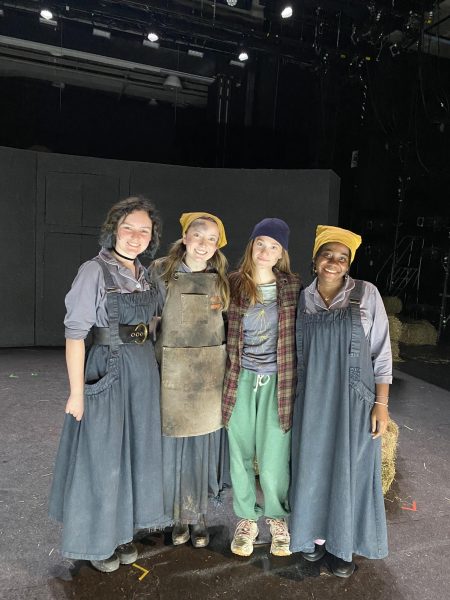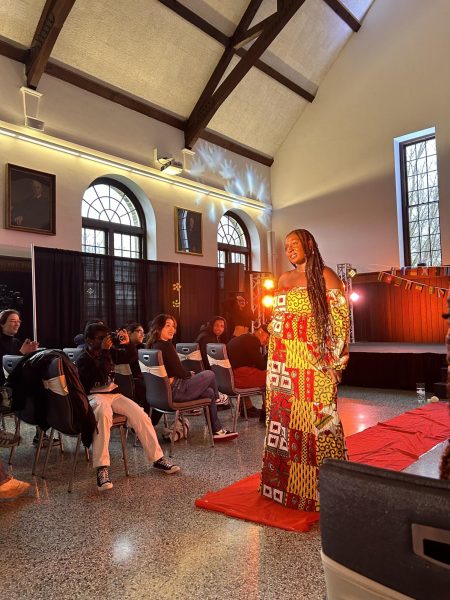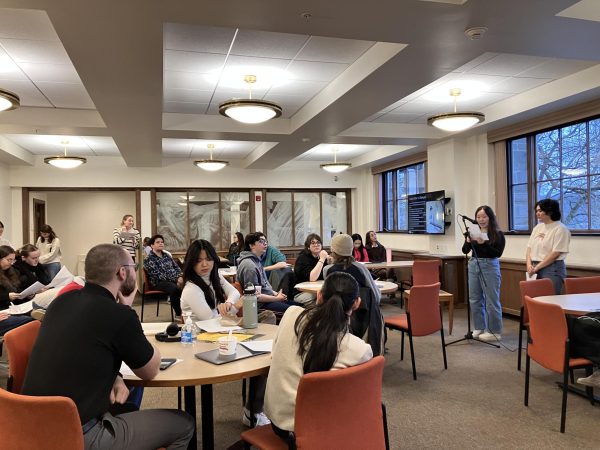A Spotless Performance: The Clean House Showcases Polished Acting
The Clean House, a play written by Sarah Ruhl and directed by senior Rachel Wassel, opened this weekend for a four-show run at the Palace Theater. A tragic-comedy, the play mixes laughter, incurable medical illness, adultery and basherts (Jewish soul-mates). The action centers around Lane (played by sophomore Liz Malugen), whose life is spiraling out of control. Her recently arrived from Brazil live-in maid Matilde (sophomore Alexandra Magnaud) does not like to clean, has just recently lost both of her parents (one to a joke, the other to suicide) and has been medicated for her inadequacies. Lane’s sister, Virginia (first-year Olivia Bioni), is a neurotic, obsessive-compulsive clean freak who thinks the definition of ‘progress’ is the removal of dust (echoes of CORE 152, anyone?). Lane’s husband Charles (sophomore Gabe Rosen) is a surgeon who falls desperately in love with Anna (sophomore Ela Dugan), one of his patients, while treating her for breast cancer.
The play itself challenges the assumption that we can retain control in this chaotic world, and suggests that those who try (Lane) end up looking more insane than those who don’t. The play also questions the role of women in the modern world – using the caricatures of overly ambitious non-feminine doctors, absurdly obsessed house-wives and near-hippie naturalists to draw a contrast to the stability, independence and strength of Matilde.
The Clean House is the first straight play done by Wassel, a veteran of the Student Musical Theater Company (SMuTCo) and current president of Masque and Triangle. Wassel’s experience in musical theater and desire to work professionally in the theater world led her to take on the challenge of a non-musical play. Her efforts are most obvious in the staging, set, lighting cues and blocking of the play (helped, of course, by a wonderful back-stage crew led by Stage Manager, sophomore Emily Suskin).
From the beginning of the run on Thursday to its close on Saturday night, the play matured. Bioni’s character blossomed from a nervous and underwhelming younger sister of Lane into a comically-OCD and confidently independent character. Dugan and Rosen gained chemistry throughout the run in their double roles as both the pair that screwed up Lane’s life and the representations of Maltilde’s parents. Magnaud’s performance was solid throughout, providing an effective sounding-board on stage from whence many of the shows best jokes came. However, the most mature and fully formed performance of the run was Malugen. She played her character straight and stole the stage with her composure, concentration and command. Her lines (especially the retort to Matilde’s “Would you like coffee?” – “I’d like a glass of hard alcohol with some ice in it, please.”) were delivered with mature and intelligent timing.
Despite its strengths, the play had two major weaknesses. First, the play itself presents a challenge to the director and actors which was not effectively dealt with. The nature of the play required an almost melodramatic tinge – reality mixed with surreality. More often than not, the characters acted as if they were delivering jokes, when the lines should have been played straight and with more conviction. This created an atmosphere where the audience knew a joke was coming – a fact that lessened the impact of some well-written reversals. Second, some of the staging was questionable. Specifically, this included an abominable cut-scene where Rosen wandered across an empty blue-lit stage in a pea-coat pretending to be in the Alaskan wilderness – a touch which caused suppressed laughter at the show rather than with it.
However, in all, the play represented the strengths of the Colgate theater community – especially highlighting the younger talent that makes theater on this campus so vibrant.






